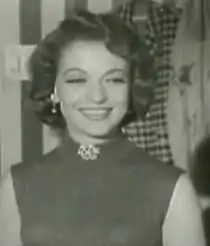Maricruz Olivier
Maricruz Olivier (September 19, 1933 – October 10, 1984) was a Mexican actress of film, television, and theater.[1][2] She is best remembered for starring in the 1959 version of the telenovela Teresa,[2] which was a success as it established her on-screen persona of playing villains.[2]
Maricruz Olivier | |
|---|---|
 Maricruz Olivier in Angelitos del trapecio (1959) | |
| Born | María de la Cruz Olivier Obergh September 19, 1935 |
| Died | October 10, 1984 (aged 51) |
| Occupation | Film and television actress |
| Years active | 1953–1984 |
Early life
Olivier was born María de la Cruz Olivier Obergh to Mercedes Shirley Obergh in the city of Tehuacán, Puebla.[1][2] Olivier studied philosophy, literature, and acting for two years in the Academia Andrés Soler.[2] Her film debut was in Esos de Penjamo in 1951, and her theatrical debut was in the play, Que no es cordero.[2] Because of her participation in the 1955 play Santa Juana, Olivier became one of the most important young actresses of the decade.[2]
Film career
Although Olivier was popularly known for playing villainous-type roles, she had also appeared in many other different film genres. In 1959, she co-starred with Anabel Gutiérrez as one of the love interests of Viruta y Capulina (popular comic actors at the time) in the comedy film, Angelitos del trapecio.
In 1962, she starred with Antonio Aguilar in the revolutionary-drama Sol en llamas, where she portrayed an hacendado's daughter in the midst of an hacienda during pre-revolutionary Mexico in 1910.
Aside from all these genres, her astounding sinister-beauty and acting captivated the audience to believe in her work. As she once quoted in 1983:
"The villains gave me fame. The people have hated my roles of cursed women, only four in my career. I know that they don't hate me. In the minds of people I did not stay a villain, but an actress. When I did Teresa, there were those who stopped me on the street to give me advice: do not be a bad daughter missy! Behave better with your parents! Other people told me: what a horrible behavior! Behind all this I was still interpreting her."[2]
Filmography (Selected)
- Quinceañera (1960)
- Teresa (1959)
- El derecho de nacer (1966)
- El caballo bayo (1966)
- Un dorado de Pancho Villa (1967)
- Hasta El Viento Tiene Miedo (1968)
- Como pescar marído (1968)
- El oficio más antiguo del mundo (1970)
- Tres Mujeres en la Hoguera (1979)
TV
- Teresa (1959)
- Estafa de amor (1968)
- Barata de primavera (1975)
- Viviana (1979)
References
- "Olivier, Maricruz. Biographical Dictionary of Mexican Film Performers "N" and "O"". Retrieved 9 September 2011.
- "Biografía de Maricruz Olivier". Retrieved 9 September 2011.
External links
Bibliography
- Agrasánchez Jr., Rogelio (2001). Bellezas del cine mexicano/Beauties of Mexican Cinema. Archivo Fílmico Agrasánchez. ISBN 968-5077-11-8.